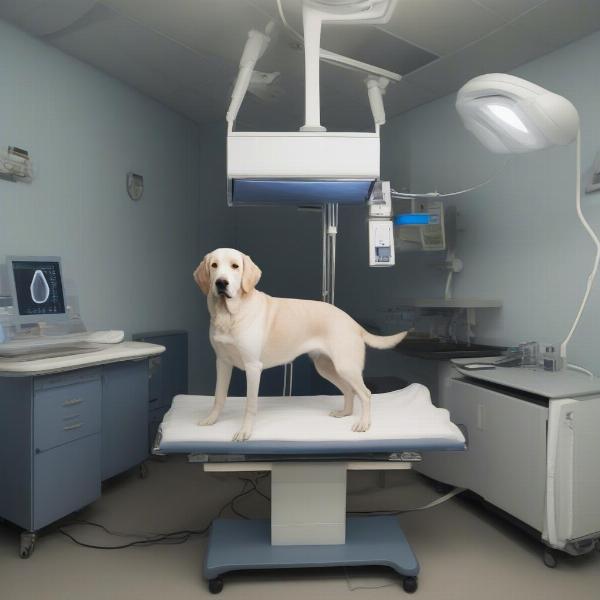Understanding the various tests available for dogs is crucial for responsible pet ownership. Whether you’re a seasoned dog owner or just starting out, knowing what tests are available can help you make informed decisions about your dog’s health and well-being. From routine check-ups to diagnosing specific conditions, tests for dogs play a vital role in preventative care and treatment. This article will delve into the different types of tests for dogs, their purposes, and what you can expect from the results.
Understanding the Importance of Tests for Dogs
Regular tests for dogs are essential for maintaining their overall health. Early detection of potential health problems through routine screenings can significantly improve treatment outcomes and potentially save your dog’s life. These tests can range from simple blood work to more complex diagnostic imaging.
Common Types of Tests for Dogs
Several common tests for dogs help veterinarians assess their health. These include:
- Complete Blood Count (CBC): This test evaluates the different types of blood cells and can help detect infections, anemia, and other blood disorders.
- Blood Chemistry Panel: This panel analyzes various substances in the blood, such as electrolytes, enzymes, and hormones, providing insights into organ function and overall health.
- Urinalysis: Examining a dog’s urine can reveal kidney disease, urinary tract infections, and other metabolic issues.
- Fecal Examination: This test checks for parasites and other abnormalities in the digestive system.
Diagnostic Tests for Specific Conditions
Beyond routine tests, specialized tests for dogs can diagnose specific conditions. These may include:
- Allergy Testing: This helps identify environmental or food allergies that may be causing skin problems, itching, or digestive issues.
- Heartworm Test: This simple blood test detects the presence of heartworm, a serious parasite transmitted by mosquitoes.
- Tick-Borne Disease Tests: These tests screen for diseases like Lyme disease, ehrlichiosis, and anaplasmosis, which are transmitted through tick bites.
 X-ray Imaging for Dogs
X-ray Imaging for Dogs
Genetic Testing: A Deeper Dive into Your Dog’s DNA
Genetic tests for dogs, like the dog dna test, are gaining popularity. These tests can reveal a dog’s breed ancestry, predisposition to certain genetic diseases, and even traits like coat color and size.
“Genetic testing offers valuable insights into a dog’s health and can help owners make proactive decisions about their care,” says Dr. Emily Carter, DVM, a veterinary geneticist.
Understanding Test Results and Working with Your Veterinarian
Interpreting test results can be complex. Your veterinarian will explain the findings and recommend any necessary treatment or further testing. Don’t hesitate to ask questions and seek clarification. Open communication with your vet is key to ensuring your dog receives the best possible care. Remember, some dogs may require specific tests based on their breed, age, or health history. For example, springer spaniel stud dogs may require specific health screenings.
What if my dog has foamy vomit?
If your dog experiences foamy vomit in dogs, it’s crucial to consult a veterinarian. While it can sometimes be due to relatively benign causes like an empty stomach, it can also indicate more serious underlying issues.
What is a titer test for dogs?
A titer test for dogs measures the level of antibodies in a dog’s blood, indicating immunity to specific diseases. This is particularly useful for determining if booster vaccinations are necessary.
“Regular veterinary check-ups, including appropriate tests for dogs, are the cornerstone of preventative care,” adds Dr. Sarah Mitchell, DVM, a small animal practitioner. “These visits provide an opportunity to address any potential health concerns early on, leading to better outcomes for our furry companions.”
Conclusion
Tests for dogs are vital tools for ensuring their health and longevity. From routine check-ups to specialized diagnostic tests, understanding the various options available and working closely with your veterinarian can help you provide the best possible care for your canine companion. Remember, early detection is often key to successful treatment and a long, happy life for your dog.
FAQ
- How often should my dog have blood work done? This depends on your dog’s age, breed, and overall health. Your veterinarian will recommend an appropriate schedule.
- Are there any risks associated with tests for dogs? Some tests may carry minimal risks, such as slight discomfort during blood draws. Your veterinarian will discuss any potential risks before performing a test.
- How much do tests for dogs typically cost? The cost varies depending on the type of test and your location. It’s best to contact your veterinary clinic for specific pricing information.
- What if my dog is afraid of going to the vet? Talk to your veterinarian about strategies for reducing your dog’s anxiety, such as using positive reinforcement and familiarizing your dog with the clinic environment.
- Can I perform any tests for dogs at home? While some at-home tests are available, they shouldn’t replace regular veterinary check-ups and professional testing.
- What if my dog shows symptoms like excessive thirst or urination? These could be signs of underlying health issues, and you should consult your veterinarian promptly.
- How can I find a reputable veterinarian in my area? Ask for recommendations from other dog owners or search online for veterinary clinics with positive reviews.
Related Articles
If your dog suffers from facial paralysis, check out our article on dogs with bell’s palsy.
About ILM Dog
ILM Dog (ilmdog.com) is your trusted international resource for all things dog-related. From breed selection and health care to training, nutrition, and grooming, we offer expert advice and practical tips to help you provide the best possible care for your furry friend. We also offer guidance on choosing the right products and accessories for your canine companion. Whether you’re a new dog owner or a seasoned expert, ILM Dog is here to support you every step of the way. Contact us today for personalized advice and to explore our extensive resources! Email: [email protected], Phone: +44 20-3965-8624.